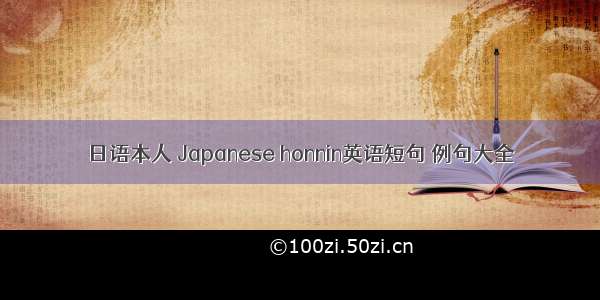
日语祈使句,Japanese imperative sentence
1)Japanese imperative sentence日语祈使句
1.This report will takeJapanese imperative sentences as the research object,and take deep and systematic research and summary to make a comprehensive undersatanding.本论文以日语祈使句为研究对象,深入系统的对其进行分析与归纳,以期达到对其全面认识的目的。
英文短句/例句
1.Study on Mode of Verbal Predicates in Modern Japanese Imperative Sentences;现代日语祈使句中动词性谓语的语气研究
2.The Semantic and Syntactic Analysis of State Adjectives in Imperative Sentences;祈使句中状态形容词的句法语义分析
3.Sentences for Speech Acts with Special Reference to Interrogatives and Imperatives: Selected Parts of AHandbook for Grammatical Investigation and Research;句类及疑问句和祈使句:《语法调查研究手册》节选
4.On the Selectivity of Modal Particles in Imperative Sentences in Modern Chinese;现代汉语祈使句句末语气词选择性研究
5.The Imperative "VA点儿"and its Transformational Rules of Word Order;“VA点儿”祈使句及其语序变换规律
6.On the Conditioned Choice of Subjects in Imperative Sentences;祈使句“你/你们”主语的选择制约因素
7.A Functional-pragmatic Approach to Directive Power of Advertisement Directives;广告祈使句指令力之功能—语用辨析
8.The Indirect Imperative in German and English;从语法角度看德语和英语中的间接祈使句
9.Metaphoric and Metonymic Motivations for a Special Type of Imperative Sentences in Chinese;汉语中一类特殊祈使句的转喻和隐喻动因
10.The Imperative Sentences and Their Directives Gradations the Illocutionary Force Concerned on Zutangji;《祖堂集》祈使句及其指令行为的语力级差
11.Minimalist Analysis on the Syntactic Features of Don’t in English Negative Imperatives最简方案视角下否定祈使句中心语Don’t的句法分析
12.To look out. Often used in the imperative.当心。常用于祈使句中
13.esp imperative in prayers尤用於祷文中的祈使句
14.Often used in the negative imperative常用於否定的祈使句中
15.Discourse Function of the Particle Ba in the Imperative Sentence from the Perspective of Relevance Theory关联理论视角下语气词“吧”在祈使句中的话语功能探析
16.You use some question tags to make imperatives more polite.反意疑问句也用以使祈使句更礼貌。
17.On Pragmatic Features of Causative and Transitive Constructions in Japanese;日语使动句式和他动词句式的语用特征
18.On the Cause of the Restrictions on "tai" Structure;试论限制日语“たい句”式使用的因素
相关短句/例句
The optative mood.祈使语句
3)vocative imperative sentences呼语祈使句
1.It is quite free for the second person subject invocative imperative sentences to apprear or hide,but there still are some rules in it.呼语祈使句第二人称主语的隐现比较自由,但"是隐是现"还是呈现出一定的倾向性。
4)imperative mood祈使句式
1.In fact,there is no gram-matical category of theimperative mood in English at all.英语动词祈使句式的主语总是第二人称,都是受话者;其谓语动词形式是现在时的第二人称形式,实质上,英语动词中不存在祈使语气的语法范畴。
5)imperative sentence祈使句
1.The Implicit Negative Imperative Sentence in Chinese;现代汉语中的隐性否定祈使句
2.The mediaeval times were the crucial period toimperative sentence to develop to its maturity and stereotypes.中古是祈使句走向成熟与定型的关键时期。
6)Imperative Sentences祈使句
1.The pragmatic difference of the imperative sentences in Selection of Qu-verses of Yuan Dynasty《元曲选》祈使句的语用差异
2.The existence of the selectivity of modal particles in imperative sentences in modern Chinese is due to the fact that the employment of the modal particles is closely related to both the subjects and the types of the imperative sentences.现代汉语祈使句句末语气词的分布存在选择性,其原因与祈使句的类别及主语人称有关。
3.This article approaches the negative and emphatic forms of English imperative sentences,analyses their characteristics and illustrates their uses in different contexts.探讨了英语祈使句的否定式和强调式的各种形式,并分析了它们的特点和使用的场合。
延伸阅读
呼语1.语法用语。说话中对所呼唤的人或事物的称呼,属于独立成分。它的位置灵活,可放在句首﹑句中或句尾。如:老王,你今天去图书馆吗?"老王"就是呼语。
















